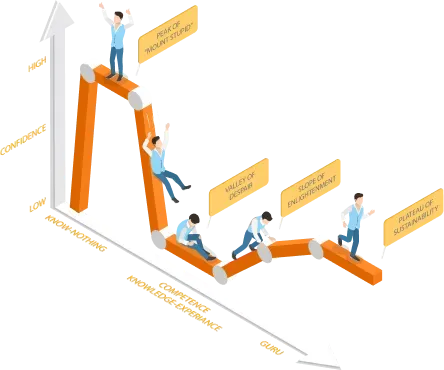The (not so) Invisible Man and the Dunning-Kruger Effect
MacArthur Wheeler was convinced he had cracked the code for the perfect bank robbery. No mask, no gimmicks, no elaborate plan—just lemon juice.

MacArthur Wheeler was convinced he had cracked the code for the perfect bank robbery. No mask, no gimmicks, no elaborate plan—just lemon juice. That morning, he carefully rubbed it all over his face, like it was some kind of high-end skincare routine, and then he checked himself in the mirror, squinting against the light, trying to spot any signs of visibility.
Nothing.
A grin spread across his face. This was it. It actually worked.
The (not so) Invisible Man
It was a warm spring afternoon in Pittsburgh. Wheeler strolled down the sidewalk, blending right in; no one gave him a glance—not that he expected them to. As far as he was concerned, they couldn’t see him. He stopped in front of his target: the first bank on his list. After a quick look around, he crossed the street, making sure not to get run over, because, you know, invisible or not, that would be a problem. When he reached the building, he stepped right up to the security camera, grinned, and then got inside like he owned the place.
Nothing to worry about?
Once inside, he moved through the lobby slowly, like he was trying not to draw attention—though, in his mind, there was no attention to draw. He leaned forward slightly and slid a note across the counter to the cashier. Big, bold letters spelled out: “Give me the money. I have a gun.”
Then, he placed a bag in front of her. She hesitated, eyes darting from the note to his face: Something clearly wasn’t adding up. For a second, she just stared, confused, but Wheeler didn’t flinch. He stood there, calm, with the smug confidence of a guy who thought he had it all figured out. Finally, she started loading cash into the bag, and Wheeler took the money and strolled out like he had all the time in the world. And because that wasn’t enough, he hit another bank. Same approach. Same confidence. He wasn’t worried about cameras. He wasn’t worried about the cops. After all, in his mind, there was nothing to worry about.
Good cop and bad coop
Back in his apartment, Wheeler was still basking in the glow of his success when there was a knock at the door. He opened it to find two uniformed cops staring back at him. His eyes went wide as they held up the security footage—clear as day, his face right there on the screen.
“But... I used lemon juice!” he blurted out, genuinely shocked. “My face should be invisible!”
One of the officers, a stocky guy who was sweating under his uniform, gave Wheeler a puzzled look. “Invisible?” he said.
“Yeah, invisible,” Wheeler insisted.
The younger cop chimed in, trying to keep a straight face. “Yeah, well... the cameras seem to disagree.”
Wheeler stammered. “But it’s supposed to work! Like invisible ink...”
The two officers exchanged a glance. The older one sighed and shrugged. “Sorry, Houdini, but we’re taking you in.”
They cuffed him—no rush, no struggle. Wheeler just kept shaking his head, unable to process it.
The lemon juice was supposed to work.
Sure.
What the hell went wrong?
There had to be some explanation.
Dunning-Kruger effect
Wheeler might not be remembered as the smartest thief, but his story caught the attention of two psychologists, David Dunning and Justin Kruger. It wasn’t his naivete that intrigued them—it was his rock-solid confidence in a plan that made zero sense. Could someone really believe that rubbing lemon juice on their face would make them invisible? To find out, the researchers ran a series of experiments. They had volunteers take tests on logic, grammar, and even humor—then asked them to rate their own performance.
Prediction 1
Incompetent individuals, compared with their more competent peers, will dramatically overestimate their ability and performance relative to objective criteria.
Prediction 2
Incompetent individuals will suffer from deficient metacognitive skills, in that they will be less able than their more competent peers to recognize competence when they see it—be it their own or anyone else’s.
Prediction 3
Incompetent individuals will be less able than their more competent peers to gain insight into their true level of performance by means of social comparison information. In particular, because of their difficulty recognizing competence in others, incompetent individuals will be unable to use information about the choices and performances of others to form more accurate impressions of their own ability.
Prediction 4
The incompetent can gain insight about their shortcomings, but this comes (paradoxically) by making them more competent, thus providing them the metacognitive skills necessary to be able to realize that they have performed poorly.
That’s the Dunning-Kruger effect in action: The less people know, the more they think they know, ‘cause to realize you’re bad at something, you actually need a certain level of skill—something clueless people just don’t have. If you’re unfamiliar with something, you also don’t have the tools to grasp how little you know. On the other hand, people with real expertise see how complex a subject is and tend to be more cautious about what they claim to know. Kind of a paradox, because in the end, the people who know the least but are the most confident often get the most attention and credibility, and those who are knowledgeable stay silent because they’re struggling with a sense of insecurity.

Lemons and criminals
This is pretty much everywhere, especially on social media, where being popular basically means being credible. Why bring this up? Well, a friend of mine—a doctor!—came home the other day convinced he’d found a cure for a disease he’s been dealing with for a while, but it was ridiculously expensive and completely useless. Why did he believe in it? Honestly, I don’t know. Maybe I would’ve believed in it too. I mean, I do have a lemon in my hands…
So, what matters more these days—popularity or actual competence? And can the two even coexist? And when it comes to books, how much does hype influence whether we buy and enjoy them?4
What’s really important here? And most importantly, can we really express our true potential, or are we too cautious? Because, according to the Dunning-Kruger effect, here’s the thing: Those who know things and have the competence are unable to express themselves because they are blocked, while those who know little are able to gain the popularity they need to be heard. So, how can we solve this paradox?
1 The true story says that on January 6, 1995, McArthur Wheeler and Clifton Earl Johnson robbed two Pittsburgh banks at gunpoint, without trying to disguise themselves. The only thing they did to hide from the cameras was to spray lemon juice on their faces. Johnson was arrested a few days later, while Wheeler was caught in April after being identified in surveillance photos. They both got several years in prison. The robberies led to research into the Dunning-Kruger effect.
2 Justin KRUGER, David DUNNING (2009). “Unskilled and Unaware of It: How Difficulties in Recognizing One’s Own Incompetence Lead to Inflated Self-Assessments.”
3 “The Dunning Kruger Effect definition is a cognitive bias that leads people to over or underestimate their abilities compared to their actual skill set. It explains the gap between one’s confidence and competence and sheds light on how some people can be irrationally overconfident while others can be irrationally humble” [here].
4 For example, conformity bias can cause you to copy others’ behaviors or beliefs rather than follow your own judgment or wants. So, you feel like you have to act the same as the people around you, no matter what your beliefs are, and if you don’t value your skills and abilities, you’re more easily influenced.
Useful readings
- Frederic P. Miller, Agnes F. Vandome, John McBrewster, Dunning-Kruger Effect.
- Alicke, M. D.; Govorun, O. (2005). “The Better-Than-Average Effect. The Self in Social Judgment.”
- Mazor, Matan; Fleming, Stephen M. (June 2021). “The Dunning–Kruger effect revisited.”
- What is the Dunning-Kruger Effect?
- Kruger J, Dunning D. “Unskilled and Unaware of It: How Difficulties in Recognizing One’s Own Incompetence Lead to Inflated Self-Assessments.” J Personality Soc Psych. 1999.
